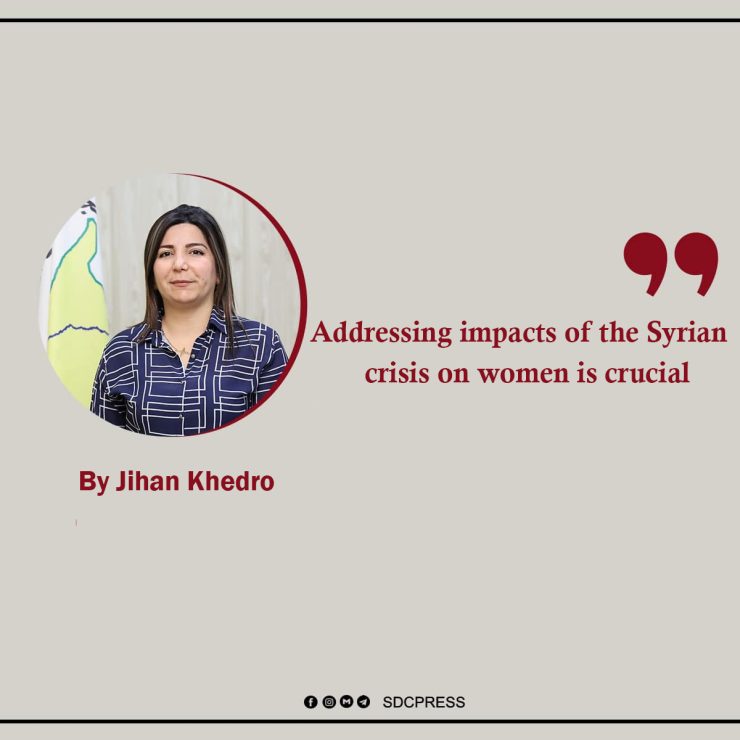By Jihan Khedro
Head of the SDC’s Women’s Office
The Syrian crisis, which has been ongoing for more than thirteen years, has resulted in a suffering and multidimensional crisis. Its tragic effects have reverberated across lives of people and development. It has caused a significant harm to social, economic, and cultural aspects. Also, it negatively affected natural environment and Syrian heritage.
The crisis has manifested in the deterioration of living conditions for the population across social, economic, psychological, and health dimensions, albeit to varying degrees. There have been many changes during the prolonged crisis which affected various regions.
While the crisis has affected all segments of society including men, women, and children. Marginalized groups, particularly women, have been disproportionately affected by the impact of the crisis. The reason lies in the fact that women have had many responsibilities during these events as well as they have faced marginalization in terms of their social status.
Discussing such a topic at this time is an attempt to explore the implications of the crisis on the situation of Syrian women. It aims to highlight their roles throughout the years of the crisis, address their various needs in these challenging circumstances, and work toward mitigating the effects they face. In general, addressing repercussions of the crisis on women is excluded and neglected. Therefore, we can propose immediate and future actions to uplift their situation. Also, it is crucial to develop forward-looking strategies for the next stages.
The importance of addressing this topic lies not only in recognizing the role of women during the current crisis but also in emphasizing their contribution to rebuilding society. Their involvement in peace-building process is essential. Additionally, they will play a crucial role in expected contributions to economic, social, and humanitarian reconstruction in Syria.
The crisis has significantly affected women, particularly in male-dominated societies. When wars erupt, peace-building process afterward becomes challenging due to male-centric behavior in some communities. These communities often fail to provide opportunities for women to participate in decision-making and peacebuilding. Despite there are no fundamental reasons preventing gender equality, stereotypes and discrimination persist on participation women in various aspects in society.
Syrian women have endured suffering during the conflict for 13 years of the Syrian crisis. However, they have not surrendered. Instead, they have become heroes. Many of them are political activists. They courageously report violations committed by the authority in Damascus. These women often serve as the sole providers for their families, risking their lives to express their opinions.
The participation of women in the political process is essential for achieving gender equality and human rights for all. The international community must address sexual violence, other forms of violence, and gender-based discrimination. Also, it should ensure an effective representation of women in peace talks, negotiations, constitution drafting, and other peacebuilding processes.
Women’s role in peacebuilding is crucial. Their success in strengthening diplomatic relations with various parties in society, especially in peacekeeping and community building, is undeniable. Their achievements are considered a source of pride. Gender equality underscores the importance of maintaining equal rights for all individuals in society. The more equality prevails, the less violence occurs in all its forms; whether domestic, societal, or during conflicts. Therefore, achieving equality remains a key goal of sustainable development for a better future for humanity.
Syrian women played a prominent role in the civil movement, despite the male domination that has tried to prevent them from political and civil struggle.
After the Syrian situation evolved into a conflict, the suffering and challenges faced by women intensified. Therefore, we propose several measures aimed at addressing and mitigating the impact of the Syrian crisis on women. These measures include implementing strategies and tactics to enhance women’s resistance against oppressive policies and practices. They ultimately aim to achieve greater gains and promote security and peace in the region.
These measures are as following:
• Activating the conventions adopted by international organizations to combat violations against women would curb the abuses faced by Syrian women. These abuses are particularly perpetrated by Islamic groups supported by Turkey.
• Putting an end to regional interventions, especially by Turkey, in Syria’s internal affairs would prevent crimes against women in Syria overall. These crimes are particularly perpetrated in the northwestern regions of Syria, which are occupied by Turkish-backed groups, such as Afrin, Idlib, Ras al-Ain, Tel Abyad, Azaz, al-Bab, and Jarabulus.
• The violations perpetrated against women during the Syrian crisis rise to the level of war crimes and crimes against humanity. This necessitates the establishment of a specialized international criminal court to prosecute all parties involved in these violations. The aim is to ensure protection for women and safeguard their rights according to international humanitarian conventions and treaties.
• The demographic change and ethnic cleansing across Syrian territory, especially in areas occupied by Turkey and its proxies, have a profound impact on women. These actions exacerbate their suffering, deteriorate their mental and physical health, and simultaneously contribute to an animosity among various Syrian components. Therefore, it is imperative for local and international organizations, authorities, powers, intellectual elites, and human rights advocates to intensify efforts to support women, calling upon UN organizations to fulfill their responsibilities toward Syrian women. Such actions will contribute to enhance global security and peace.
• There is a need to establish specialized projects and centers for human development, rehabilitation and integration into society for women. Also, international, local organizations should assume their responsibilities to support these centers and initiatives.
• Given the infrastructure destruction, migration, displacement, and imposed sieges, most women in Syria experience extreme poverty and struggle to secure their livelihoods. There is a need to create economic projects that provide employment opportunities for women while preserving their dignity. The support for such initiatives should be provided by international, regional, and local powers and organizations.
• Given that women victims across various regions in Syria have experienced similar crimes and violations due to conflicts and wars, there is a need for establishing a new political, legal, and social structure for women. It will serve as a comprehensive umbrella for all organizations, institutions, and centers dedicated to Syrian women’s rights.
• Effective participation of women in shaping any new national constitution and allowing their involvement in future reconstruction projects would ensure women’s rights and alleviate their suffering.
Certainly, the ongoing Syrian crisis, which has lasted for over a decade, has resulted in devastating consequences on all Syrian components in general and women in particular. Displaced Syrian women have endured harsh hardships, bearing additional burdens amidst extreme poverty and grave violations of their human rights.
However, despite these challenges, Syrian women have demonstrated unparalleled courage and resilience. They have played a crucial role in the struggle for peace and freedom, defying all obstacles and marginalization they have faced.
The future of Syria will not be stable and secure without ensuring women’s rights and empowering them in all fields. Therefore, the international community, local powers, and regional actors should promptly assume their responsibilities to support Syrian women. Comprehensive strategies should be adopted to protect and actively engage women in peacebuilding and reconstruction in Syria.
The rights and dignity of Syrian women are no longer merely a local issue; they are considered a global humanitarian concern. Also, gender equality is not just a slogan; it is the foundation for building just, peaceful, and stable societies. Achieving this goal requires concerted local and international efforts to empower Syrian women and enable their full participations in shaping their country’s future.




